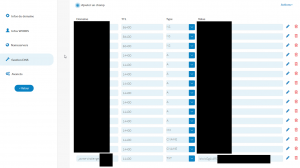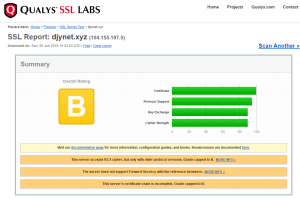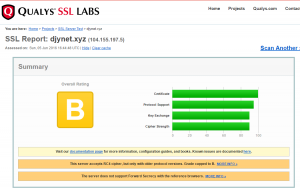Last week I had to generate a SSL certificate for a domain which has its web server on a corporate network. The Web Server on the corporate network has outgoing internet access but cannot be reach from Internet. I was not sure it was possible to generate a certificate in this case with let’s encrypt since my previous experience was with a Web server reachable from internet to answer the let’s encrypt challenge (http://djynet.net/?p=821).
Luckily I was wrong 😉 It is indeed possible to prove let’s encrypt that you own the domain with a DNS challenge! Here are my notes on how to do it.
Download the client with:
wget https://dl.eff.org/certbot-auto
chmod a+x ./certbot-auto
Run the client in manual mode with DNS challenge and wait for the client to provide you the challenge
[root@vps99754 ~]# ./certbot-auto certonly --manual --preferred-challenges dns --email <your email> -d <the domain>
Saving debug log to /var/log/letsencrypt/letsencrypt.log
Obtaining a new certificate
Performing the following challenges:
dns-01 challenge for <the domain>
-------------------------------------------------------------------------------
NOTE: The IP of this machine will be publicly logged as having requested this
certificate. If you're running certbot in manual mode on a machine that is not
your server, please ensure you're okay with that.
Are you OK with your IP being logged?
-------------------------------------------------------------------------------
(Y)es/(N)o: Y
-------------------------------------------------------------------------------
Please deploy a DNS TXT record under the name
_acme-challenge. <the domain> with the following value:
bIwIxGg1IXXXXXXXXXXXXXXXXXXXXXXXXXXXXXX
Once this is deployed,
-------------------------------------------------------------------------------
Press Enter to Continue
At this point you just need to update your DNS with the entry provided as show in the following picture and press enter (maybe wait few seconds after you done the update if you use a webUI like me to update your DNS provider)

Waiting for verification...
Cleaning up challenges
Generating key (2048 bits): /etc/letsencrypt/keys/0000_key-certbot.pem
Creating CSR: /etc/letsencrypt/csr/0000_csr-certbot.pem
IMPORTANT NOTES:
- Congratulations! Your certificate and chain have been saved at
/etc/letsencrypt/live/<the domain>/fullchain.pem. Your cert will
expire on 2017-07-23. To obtain a new or tweaked version of this
certificate in the future, simply run certbot-auto again. To
non-interactively renew *all* of your certificates, run
"certbot-auto renew"
- If you like Certbot, please consider supporting our work by:
Donating to ISRG / Let's Encrypt: https://letsencrypt.org/donate
Donating to EFF: https://eff.org/donate-le
All set 😉 Pretty easy and very nice feature to validate a Webserver not connected to internet (as long as you have access to its DNS server and it is reachable from internet).




